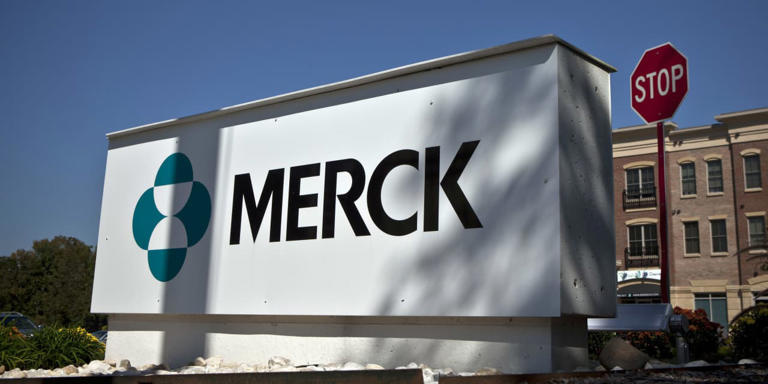$1 Billion US Factory: Merck Expands Domestic Production Of Blockbuster Drug

Table of Contents
The Significance of Merck's $1 Billion Investment
Merck's decision to invest $1 billion in a new US facility for Keytruda manufacturing carries profound strategic and economic implications. This substantial investment reflects a broader trend of pharmaceutical companies reshoring their production capabilities, driven by several key factors:
-
Enhanced Supply Chain Resilience: The COVID-19 pandemic exposed vulnerabilities in global supply chains. By increasing domestic production, Merck mitigates risks associated with disruptions caused by geopolitical instability, natural disasters, or pandemics. This ensures a more reliable supply of Keytruda to US patients.
-
Reduced Reliance on Foreign Manufacturing: Shifting production to the US reduces dependence on overseas manufacturing facilities, offering greater control over quality, timelines, and intellectual property. This strategic move strengthens Merck's position in the US market.
-
Meeting Growing US Demand for Keytruda: Keytruda's continued success as a leading cancer immunotherapy necessitates increased production capacity to meet the growing demand within the United States. The new factory directly addresses this need.
The economic impact of this investment is substantial:
-
Job Creation: The construction and operation of the new facility will create numerous high-skilled jobs in manufacturing, research, and support roles, providing a significant economic boost to the local community.
-
Economic Stimulus: The project will inject billions of dollars into the local and national economies through construction contracts, material purchases, and increased employment.
-
Contribution to US GDP: The increased domestic production of Keytruda will positively contribute to the US Gross Domestic Product (GDP) and strengthen the US pharmaceutical industry's overall contribution to the national economy.
This investment positions Merck for long-term competitiveness in the global pharmaceutical market by ensuring reliable access to resources and a strengthened US presence.
Keytruda: The Blockbuster Drug Driving the Investment
Keytruda, a PD-1 inhibitor, is a leading immunotherapy drug used in the treatment of various cancers. Its remarkable success has propelled it to become a significant revenue generator for Merck:
-
Cancer Treatment Applications: Keytruda's effectiveness in treating numerous cancers, including lung cancer, melanoma, and bladder cancer, has solidified its position as a first-line treatment option in many cases.
-
Market Leading Immunotherapy: Keytruda’s significant market share demonstrates its dominance within the immunotherapy drug class and underscores its importance in the fight against cancer.
-
Enhanced Patient Access: Increased domestic production will ensure greater accessibility of Keytruda for US patients, reducing reliance on imports and mitigating potential supply chain disruptions. This contributes to improved patient outcomes and equitable access to life-saving medication.
Implications for the US Pharmaceutical Industry
Merck's decision to significantly invest in domestic pharmaceutical manufacturing has broader implications for the US pharmaceutical industry:
-
Ripple Effects on Other Companies: Merck's initiative could inspire other pharmaceutical companies to reconsider their manufacturing strategies and potentially invest in reshoring their production to the United States.
-
Impact on Drug Pricing and Accessibility: Increased domestic production may influence drug pricing dynamics and potentially lead to more affordable access to essential medicines for US consumers, although this remains complex and depends on other market factors.
-
Role of Government Policies: Government policies and regulations play a crucial role in shaping the landscape of domestic pharmaceutical manufacturing. Incentives, tax breaks, and streamlined regulatory processes can encourage further investment in US-based production.
The Future of US-Based Pharmaceutical Production
The reshoring trend in pharmaceutical manufacturing represents a significant shift in the global landscape:
-
Improved Supply Chain Security: Increased domestic production strengthens supply chain security, reducing vulnerabilities to external disruptions and ensuring a reliable supply of essential medicines.
-
Challenges and Opportunities: The US pharmaceutical industry faces challenges in maintaining a competitive edge in global manufacturing, including labor costs and regulatory hurdles. However, strategic investments, government support, and technological advancements present opportunities to overcome these challenges.
-
Further Investments: Merck’s investment may signal a wave of further investments in domestic pharmaceutical production, creating a more resilient and self-sufficient US healthcare system.
Conclusion
Merck's $1 billion investment in a new US factory for its blockbuster drug, Keytruda, represents a significant milestone in pharmaceutical manufacturing. This commitment to domestic production emphasizes the growing importance of reshoring, bolstering the US economy, enhancing supply chain resilience, and ultimately improving access to vital medicines for American patients. This investment not only benefits Merck but also signals a potential turning point for the US pharmaceutical industry.
Call to Action: Stay informed about the evolving landscape of US pharmaceutical manufacturing and the continued impact of investments like Merck's $1 billion factory expansion on the future of drug production and access. Follow [your website/publication] for the latest updates on Keytruda, Merck, and other critical developments in the US pharmaceutical industry.

Featured Posts
-
 Profilaktika Na Raka Na Grdata Nestandarten Podkhod Ot Onkokhirurg I Fitnes Trenor Za 8 Mart
Apr 30, 2025
Profilaktika Na Raka Na Grdata Nestandarten Podkhod Ot Onkokhirurg I Fitnes Trenor Za 8 Mart
Apr 30, 2025 -
 Police Watchdogs Ofcom Complaint The Chris Kaba Panorama Investigation
Apr 30, 2025
Police Watchdogs Ofcom Complaint The Chris Kaba Panorama Investigation
Apr 30, 2025 -
 Organiser Les Places Assises Pour Des Funerailles Papales Une Tache Compliquee
Apr 30, 2025
Organiser Les Places Assises Pour Des Funerailles Papales Une Tache Compliquee
Apr 30, 2025 -
 Comprendre Le Document Amf Cp 2025 E1027692 D Ubisoft Entertainment
Apr 30, 2025
Comprendre Le Document Amf Cp 2025 E1027692 D Ubisoft Entertainment
Apr 30, 2025 -
 1 Billion Us Factory Merck Expands Domestic Production Of Blockbuster Drug
Apr 30, 2025
1 Billion Us Factory Merck Expands Domestic Production Of Blockbuster Drug
Apr 30, 2025
